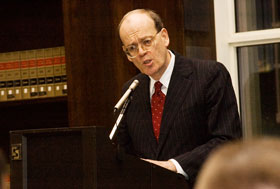  |
| HOME | THIS ISSUE | CALENDAR | GRANTS | BACK ISSUES | < BACK | NEXT > |
Unpopular U.S. foreign policy to prevail, Gerson lecturer saysby Cindy Weiss - April 10, 2006
|
||||
|
The United States will maintain its role of unilaterally intervening abroad for at least the next two decades, despite international criticism and the unpopularity at home of its foreign policy, according to Johns Hopkins Professor Michael Mandelbaum. The Christian A. Herter Professor of American Foreign Policy at Johns Hopkins, Mandelbaum gave the annual Gerson Foreign Policy Lecture April 4 in the North Reading Room of Wilbur Cross. Mandelbaum, who is often is a guest on TV news shows and writes a foreign affairs column for Newsday, said that “government” rather than “empire” most accurately describes the U.S. global role of keeping order in the world and preventing nuclear proliferation. “The mere presence of the U.S. military in Europe and Eastern Asia has a reassuring effect,” he said, by relieving countries of the anxiety of threats from their neighbors. The U.S. role as the world’s government, which has developed since the end of the Cold War, is unprecedented, Mandelbaum said. He characterized it as positive, despite the criticism. “A certain level of complaint about U.S. policies is inevitable,” he said. Other countries criticize the dominant U.S. role, but they tacitly legitimize it by their acceptance of the services that the U.S. provides, he maintained. These include the enforcement of order, acting as a lender and a consumer of last resort, and providing a “public utility” function of ensuring a global supply of oil by protecting the Persian Gulf, he said. Europeans in particular are unhappy with the ideology of the current U.S. administration, he said, but they will not stop the U.S. in its global role because that would “eliminate their free ride.” Where American foreign policy does the most harm is in the area of energy, Mandelbaum said. The high per capita consumption of energy in the U.S. increases the demand for oil and puts this country at the mercy of unstable, aggressive countries that have oil, he noted: “American energy consumption funds terrorism and props up bad governments.” Mandelbaum said that both the Clinton and George W. Bush administrations have furthered the global government role of the U.S. – Clinton through humanitarian intervention in Haiti, Bosnia, and Somalia, and Bush by defining the doctrine of preventive war and carrying it out in Iraq. While the two presidents are often thought to be opposites on foreign policy, Mandelbaum called them “akin to fraternal twins – outwardly different, but sharing the same DNA.”
Both preventive war and humanitarian intervention have proved to be unpopular within the U.S., and both violate the sovereignty principle of international law, he said. The war in Iraq is unlikely to serve as a precedent for U.S. foreign policy, because it has turned out badly and been more costly than the public can tolerate, he said. The war “can be seen as the U.S. resisting nuclear proliferation,” he said, because if Saddan Hussein had not been removed from power, he most likely would have tried to develop nuclear weapons. Resisting nuclear proliferation, the greatest threat to global security, is a worthy role, and the U.S. should take the lead, Mandelbaum said. North Korea and Iran, two other potential developers of nuclear weapons, do not lend themselves to a preventive war, however, he said. Mandelbaum’s views on U.S. foreign policy are the subject of his latest book, The Case for Goliath: How America Acts as the World’s Government in the 21st Century, and an article, “David’s Friend Goliath” in the January/February 2006 issue of Foreign Policy. In the Gerson lecture, Mandelbaum said that “I don’t believe you can sustain an American foreign policy on the basis of altruism.” He repeated the closing argument of his book, that the rest of the world will not stop the U.S. from performing a global governing role. “They will continue to criticize it, they will not pay for it, and they will miss it when it is gone,” he said. The biggest challenge to maintaining the role will be the explosion of domestic entitlement spending as Baby Boomers age, he said: “It may make the guns versus butter choice more painful, and Americans are likely to choose butter.” The Gerson lecture is named in honor of Louis L. Gerson, professor emeritus of political science, who headed the department for a decade. |
| ADVANCE HOME UCONN HOME |

